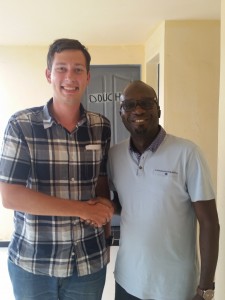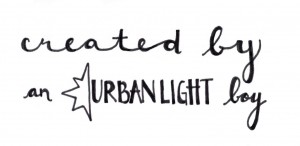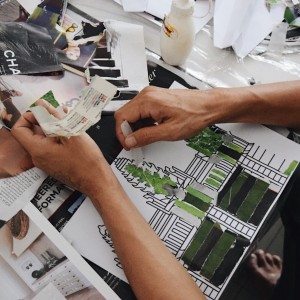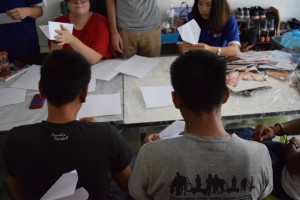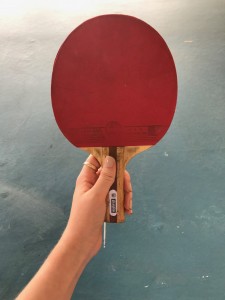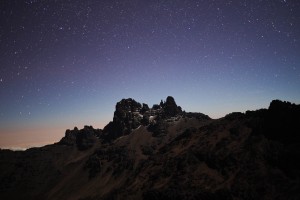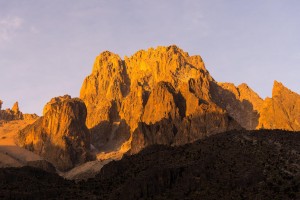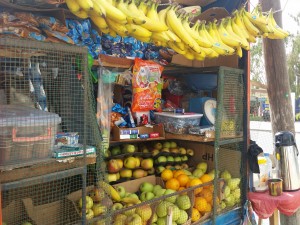Je vais vous parler des autres volontaires ici. C’est vraiment une grande partie de mon expérience au Sénégal, ils m’ont enseigné beaucoup. La plupart est européenne mais il y a des américains aussi. Jusqu’à présent j’ai rencontré plus de 40 volontaires. Je suis le plus ancien depuis longtemps mais je me souviens quand je suis arrivé. Il faut avoir des guides pour vous montrer tous les trucs de la ville. J’espère être un bon guide pour tout le monde. Ils ont des points de vue différents mais nous nous entendons quand même. Il me semble que chaque personne étrangère a des avis sur les Etats-Unis et chaque personne m’a demandé mon avis sue Donald Trump. Je souhaite que les américains sachent plus des autres pays parce que je voudrais avoir une opinion du président d’Italie.
Je vais vous raconter les mémoires les plus précieux et les plus riches pour moi. Je suis arrivé avec Laura, une française, qui a fait tout avec moi. Parce que nous étions nul ensemble, je me sentais plus à l’aise d’être incapable pour mes premières semaines ici. Elle a mangé beaucoup de Chocopain et ne me parlait que français. C’était bien pour moi parce que j’ai eu la chance de pratiquer le français tout de suite. Je suis très reconnaissant pour ça. Lewis était notre guide. Il nous a montré toutes les choses de Saint Louis, notamment comment prendre l’autobus et trouver les bons coins. De lui j’ai appris ce que les anglais pensent de leur pays, il est très intéressant. Rachel m’a enseigné un peu de dorien et je me suis amusé au travail avec elle. J’ai eu des très bonnes discussions avec Alicia (une suisse) et je les ai appréciés beaucoup. Nora, Salome, Jake, Emily et Vittorio sont inoubliables aussi.
Je suis très reconnaissant aussi aux sénégalais pour m’accueillir bien. Ma mère d’accueil m’a aidé pendant mes premières semaines et aussi Madeline (la plus jeune). Habib, un employé de Projects Abroad était indispensable. Il m’a enseigné les prix, comment négocier bien, où je peux manger et les quartiers de la ville. J’ai même visité chez lui. Après 8 ou 9 semaines, je connais bien aussi les propriétaires des boutiques, des hôtels et le coffee-shop. Quand j’ai eu une question comme « ou est-ce que je peux trouver une coiffure qui fait les coupes pour les toubabs », je leurs ai demandé. Cheikh, mon boss, m’a expliqué la situation de business ici et m’affiché ce qui se passe après on reçoit une licence ici. Il n’y a pas des jobs pour les étudiants après l’université. Sénégal n’a pas encore une économie orientée sur les services donc la femme de Cheikh qui vient de recevoir son master ne peut pas facilement trouver un job. Cela progresse un peu mais il y a beaucoup de chemins à parcourir.
C’est une belle expérience interculturelle pour moi et j’ai rencontré beaucoup d’amis. J’espère que j’ai amélioré mon français ici depuis je suis arrivé. J’ai peur de perdre mon niveau de français un jour, j’ai entendu beaucoup d’histoires où cela s’est passé. Saint Louis va me manquer, je la connais bien maintenant. Je suis enthousiaste pour mes nouvelles aventures mais je vais laisser des choses aussi.
Maintenant il y a 5 volontaires chez moi. Il est vraiment bizarre mais maintenant j’ai des nouveaux amis avec qui je parle. Je suis désolé pour le retard du dernier poste, les nouveaux me rendent occupé de temps en temps. Après ça il me reste 2 postes de plus. Je vais essayer d’être à l’heure avec les deux, mais on verra parce que je serai en train de voyager. Vittorio est malade alors je dois l’aider cette semaine. Je me souviens mes premières semaines ici. Je ne veux pas remontrer à ce temps-là.
I want to tell you about the other volunteers I have met here. They are a large part of my experience here in Senegal and they have taught me a lot. Most of them were/are European but there are some Americans as well. Up until now I have met over 40 volunteers. I have been the “eldest” volunteer for a while now but I remember coming. You need to have a guide to show you how everything works in town. I hope I am a good guide for everyone. There are many different points of view but we all get along just as well. I feel like everyone who does not live in the USA has an opinion on our country and asks me what I think of Donald Trump. I wish that Americans knew more about other countries because I would like to have an opinion on the Italian president. 
I want to share some of my most precious memories here. I arrived with Laura, a French girl, who did everything with me. Because we were both lost, I felt better about being incompetent for my first few weeks. She ate a lot of Chocopain and only spoke French, which was good for me because I had a chance to practice my French right off the bat. I am very thankful for that. Lewis (a English dude) was our guide. He showed us around Saint Louis, particularly how to take the taxis and the bus. From him I learned what English people think about their country, it’s quite interesting (but that’s a whole other story). Rachel (the Scottish girl) taught me some Doric and I had fun working with her. I had some great discussions with Alicia (the Swiss girl) and I appreciated them a lot. Nora, Salome, Jake, Emily and Vittorio are unforgettable as well.
I am very grateful to the Senegalese as well for welcoming me to their country. My host mother helped me a lot during my first few weeks as well as Madeline (the younger). Habib, an employee of projects abroad, was indispensable. He taught me the prices and how to negotiate them, where to eat and the neighborhoods in town. I have even been to his house several times. After 8 or 9 weeks, I also know all the owners of the stores, hotels and the coffee shop. When I have a question like “where do I find a barber who can cut foreigners’ hair”, I ask them. Cheikh, my boss, explained the business situation in Senegal and showed me what happens after someone gets their college degree here. There are not a lot of jobs for students who graduate from college. Senegal does not yet have a service economy and so his wife, who just finished her masters, is having a hard time finding a job. It is getting better but there is still a long way to go.
It has been a great intercultural experience for me and I have made many friends. I hope I have improved my French since coming here. I am afraid I will lose my level of French one day, I have heard a lot of stories where people lose their language skills after not using them for a while. I will miss Saint Louis, the town that I know so well. I am excited for my new adventures but I am going to leave some good things behind as well.
Now there are 5 volunteers at my house. It is really weird but now I have people to talk to while at home. I am sorry for the lateness of the last post; the new people keep me busy. After this there will be two more posts. I am going to try to be on time with the new ones but we will see because I will be travelling. Vittorio is sick and I have to help him this week. I remember my first weeks here. I do not want to go back.

